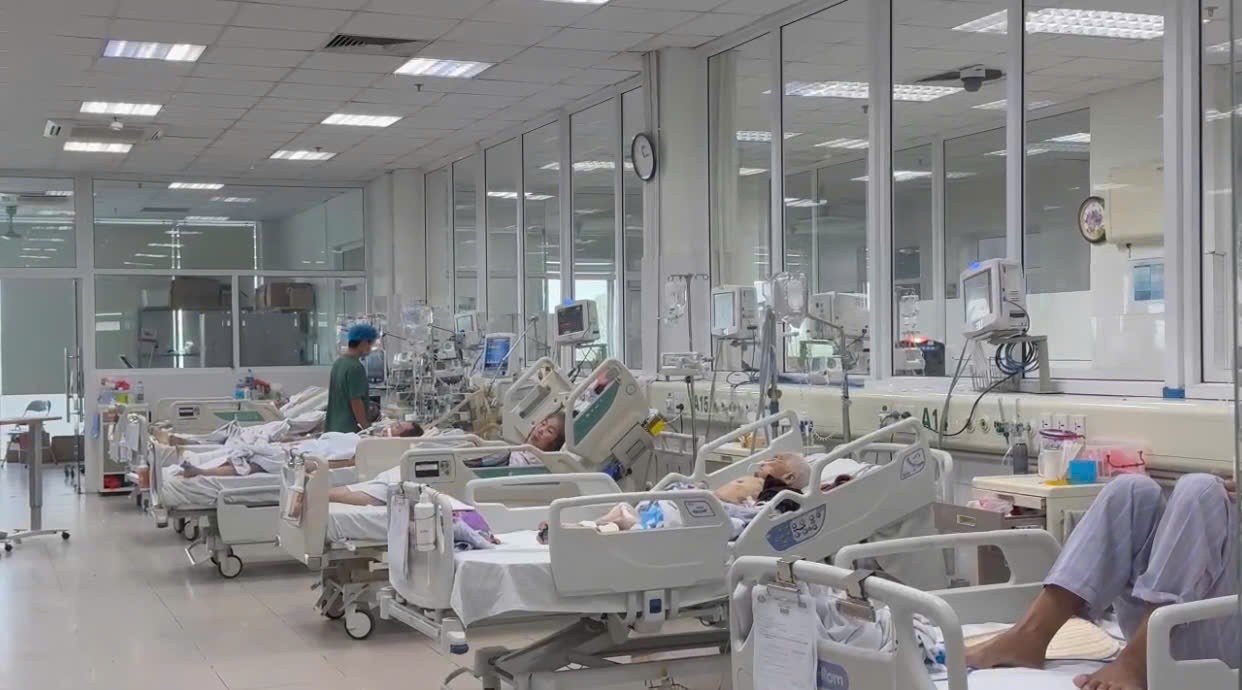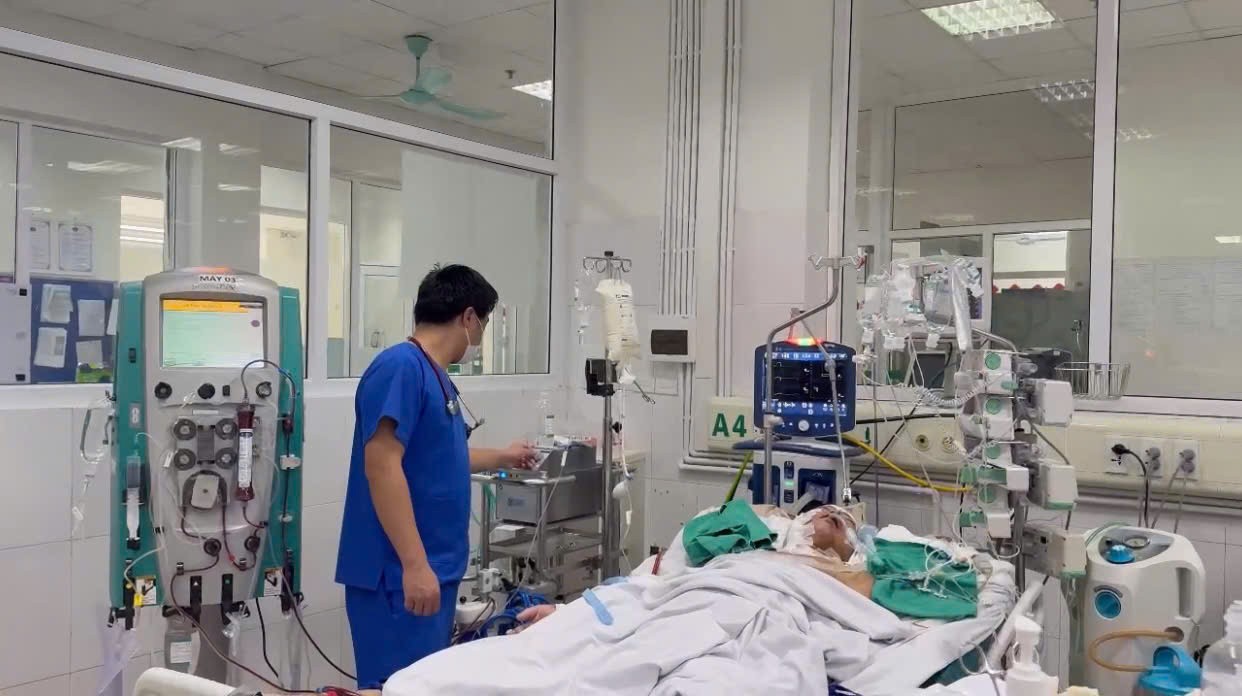Increasing severe cases, many patients in critical condition
As of the morning of February 6, the Central Hospital for Tropical Diseases is treating 13 severe flu cases. Among them, patient V.V.U (62 years old, Dong Trieu, Quang Ninh) has a history of chronic obstructive pulmonary disease (COPD) but is poorly controlled. He has been hospitalized many times in the past year due to COPD.
Three days before admission, the patient had a fever, cough, and difficulty breathing that gradually increased. After two days of treatment at the medical facility, but respiratory failure did not improve, the patient was intubated, tested positive for influenza A, and transferred to a higher level. Currently, after two weeks of treatment, the patient still needs to maintain an endotracheal tube and eat through a gastric tube.

Patient L.V.T (58 years old, Son Duong, Tuyen Quang) has a history of high blood pressure and has smoked for 30 years. He treated himself for the flu at home for a week but the condition did not improve, then he was hospitalized with severe shortness of breath. Despite intensive treatment, the respiratory failure did not improve, the patient had to be intubated. After 4 days, the fever subsided but three days later it returned with a high fever of 39 degrees. Bronchial fluid test detected bacteria, the disease progressed rapidly to septic shock.
The patient was transferred to the Intensive Care Center in a state of severe respiratory failure, with lung X-ray showing extensive damage of 80-90%. Given the risk of irreversible respiratory failure, the patient was placed on ECMO (extracorporeal membrane oxygenation). After the intervention, the patient's vital signs were temporarily stable, but he was still in severe septic shock and needed close monitoring.
Flu hospitalizations spike, many hospitalizations
At the National Children's Hospital, the number of flu cases has increased dramatically. The number of hospitalizations increased from 200 cases/week in mid-December 2024 to more than 1,200 cases during Tet - a 6-fold increase. Currently, there are 3 severe cases requiring ventilators.
According to the Ministry of Health, in 2024, there will be 289,876 cases of seasonal flu, with 8 deaths. The number of cases decreased by 17.9% compared to 2023 (353,108 cases), but the number of deaths increased by 5 cases. Experts warn that people with underlying diseases, the elderly, and immunodeficiency need to be especially careful.

The Ministry of Health's surveillance system recorded a strong outbreak of seasonal flu in Japan. The National Institute of Infectious Diseases of Japan said that from September 2, 2024 to January 26, 2025, the country had about 9.5 million flu cases, with more than 317,000 cases in the last week of 2024 alone. Tokyo, Hokkaido, Osaka, and Fukuoka were the most affected. Mainly caused by influenza A, but the risk of an outbreak of influenza B still exists.
The World Health Organization (WHO) warns that many countries in the Northern Hemisphere are experiencing an increase in acute respiratory infections caused by seasonal influenza, RSV, hMPV, and mycoplasma pneumoniae at the end of the year.
Risk of serious complications, possibly death
Dr. Khong Minh Tuan - Deputy Director of the Hanoi Center for Disease Control - said that Hanoi is facing the risk of a seasonal flu outbreak, especially in the context of the disease entering from many places. Seasonal flu has caused major epidemics such as H5N1, H1N1 and is currently breaking out strongly in Japan. Winter and spring weather conditions are favorable for the virus to develop.
The Department of Preventive Medicine emphasizes that influenza is an acute respiratory infection caused by a virus, with common symptoms such as headache, fever, cough, muscle and joint pain, and fatigue. Influenza is often more severe than the common cold, and can cause pneumonia, encephalitis, and systemic infections, which are life-threatening.

Influenza is especially dangerous for COPD patients because the virus attacks the lungs directly. People with previous lung damage are more likely to develop severe symptoms. Like patient V.V.U, respiratory failure increased rapidly after only 2-3 days, forcing a short-term endotracheal intubation.
MSc. Dr. Pham Van Phuc - Deputy Director of the Intensive Care Center, Central Hospital for Tropical Diseases - warned that influenza is dangerous for people with underlying diseases, the elderly, and immunodeficiency. The disease can cause diffuse lung damage, bacterial superinfection, myocarditis, multiple organ failure, and even death.
“Many people think that flu is a mild illness so they do not get checked early. However, for people with underlying diseases, flu can cause serious complications. When hospitalized late, the patient will have multiple organ failure, making treatment very difficult. Early detection is the decisive factor,” Dr. Phuc emphasized.
Disease surveillance, prevention of spread
The Ministry of Health requires localities to closely monitor epidemics, especially respiratory diseases such as influenza, severe pneumonia, measles, dengue fever, hand, foot and mouth disease. Border health quarantine, monitoring at border gates, communities and medical facilities are strengthened to detect and handle early, limiting severe cases and deaths.
Prevention by getting a flu vaccine, maintaining personal hygiene, wearing a mask in crowded places, washing hands regularly, and avoiding contact with sick people are important measures to protect your health during flu season.











